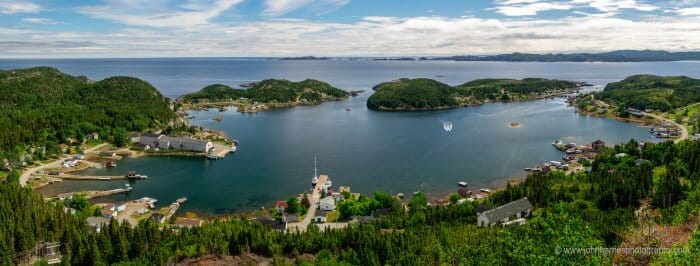
Since our last Arctic trip in 2011, John and I have been spending our summers cruising places that we rushed by on our way to and from the North but mentally bookmarked for future in-depth visits.
Our cruising ground for the summer of 2018 was the northeast coast of Newfoundland, with a focus on Fogo Island and Green Bay (Western Notre Dame Bay).
I already wrote about our wonderful stop in Fogo Harbour and the fun time we had in Lewisporte. But we had mixed feelings about our next stop: Little Bay Islands, a place that John has wanted to visit since he first saw it on the chart 25 years ago.
Outport On The Way To Nowhere
Little Bay Islands (LBI) is a small non-road-served community, one of the last in Notre Dame Bay, nestled on the shores of a snug harbour, which is sheltered by the group of islands of the same name.
Though it is not that far from mainland Newfoundland, and close to a number of other islands, the residents of LBI have a long ferry ride, followed by a long drive, to get to a shop, or a hospital, or any other services for that matter.
LBI is also out of the way for visiting mariners, tucked as it is deep in Green Bay and not on the way to anywhere. Contributing to its remoteness is the fact that not all electronic charts cover the harbour or the approaches. Our B&G plotter with Navionics charts does; C-Map, which we use on the navigation computer, doesn’t.
A Fine Harbour
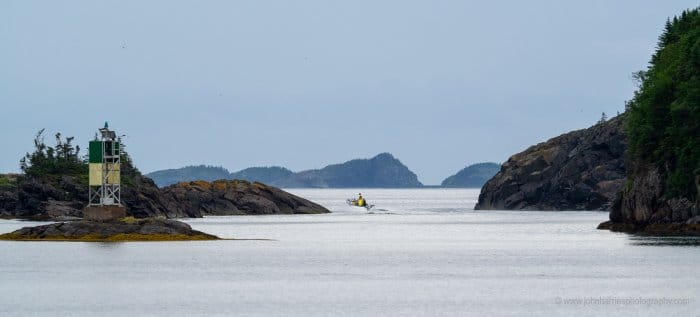
LBI is a fine place to visit by boat. The approaches are relatively straightforward (as long as the Coast Guard maintains the navigation buoys) and, though just a narrow cut between two islands, the entrance is deep.
With two relatively intact wharves and an enclosed anchorage, the harbour provides good shelter in any normal summer weather.
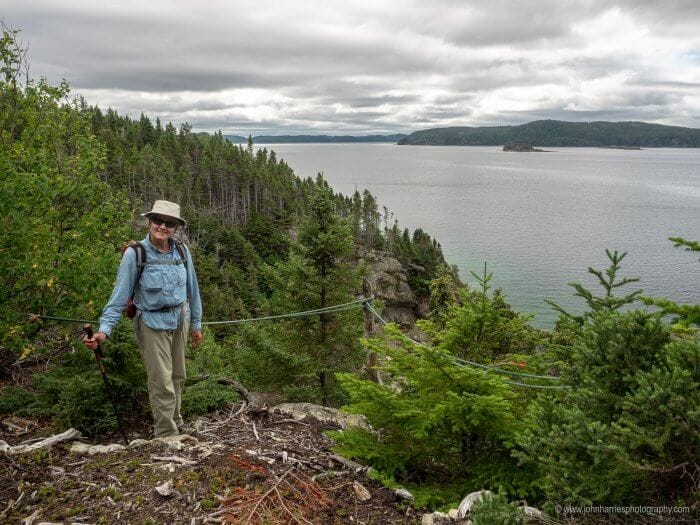
From our prime berth alongside the public wharf, John and I enjoyed exploring the islands, walking a number of hiking trails (following a somewhat out-of-date map posted in the wharf services building, and a sketch map handed out by the dock committee—more on that later) “improved” with long stretches of boardwalk over marshy areas and complex stairways up the steep bits, leading to wooden decks on stilts at scenic overlooks.
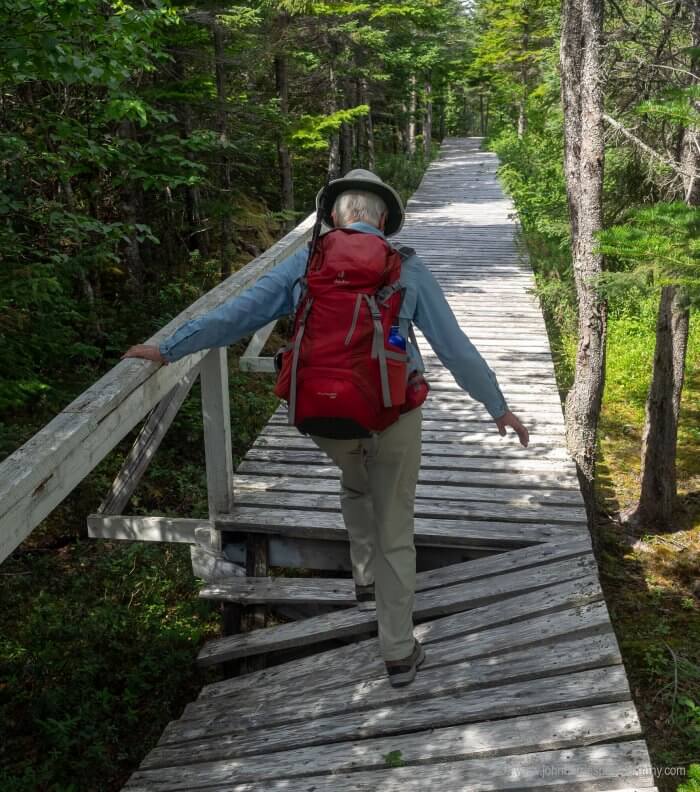
All relics of government projects implemented to employ fisherfolk after the cod moratorium, the wooden structures are now rotting and collapsing and will soon be impassable. But the looming spectre of relocation has precluded anyone spending money or time on fixing them.
A Community Torn In Two

Little Bay Islands was once a vibrant community with hundreds of residents working in the fishing industry. Though a number of people left after the cod moratorium in 1992, the town managed to carry on until 2011, when the fish plant closed. After that there was a steady outflow of inhabitants, and relocation at some point became pretty much inevitable for those who stayed.
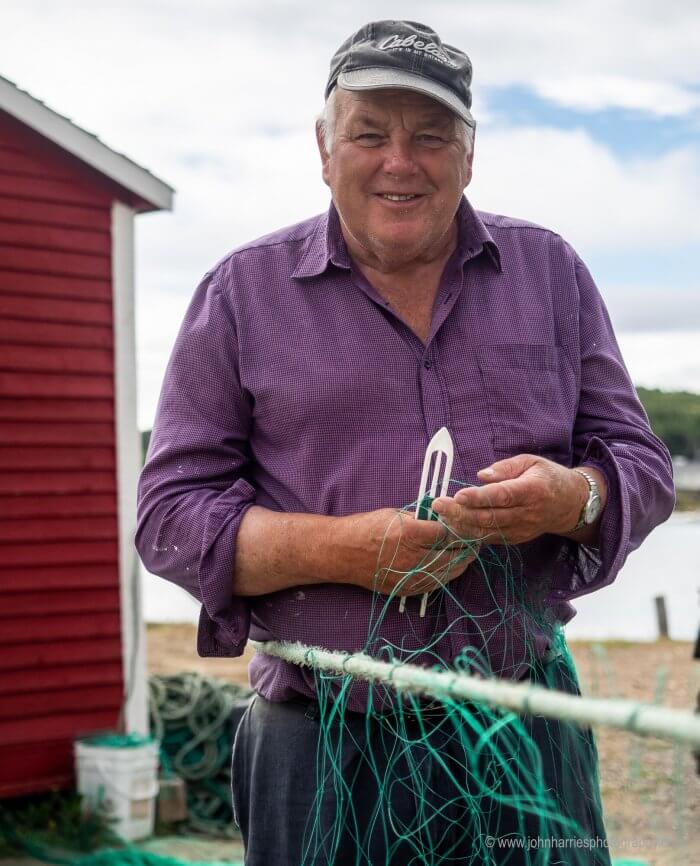
Then, in 2016, a vote was held to determine whether the remaining 80 or so full-time residents wanted to take the relocation package, and the result of the vote tore the remaining community apart.
The government mandates that 90% must vote yes to close a community. But in Little Bay Islands in 2016, “only” 89.4% voted to close shop. So the community stayed open, as did the school, though there were only two students (the school finally closed in June of 2018). And those who couldn’t afford to move elsewhere without the money granted to each household in a formal relocation were stuck.
The Committee
Undaunted by the spectre of relocation, the members of the LBI Wharf Committee, a small group of summer residents who sailed into the harbour years before and fell in love with the place, were painting the dock and sprucing up the service building during our visit.
They had run electricity (15 amp) to the dock, and installed a shower, laundry, and “Wharf-mart” (ice cream, pop and chips) in a small building on the dock, all on an honour system.
Though we promised the Committee that we would write about their community, John and I are increasingly unsure about encouraging other cruisers to visit these dying outports. We sympathize with the efforts of the Committee to save their town, but the deteriorating infrastructure, the rifts in the community fabric, and the inevitable end of the community are, frankly, upsetting to observe. We are starting to feel more and more like voyeurs at the scene of a tragedy when we spend time in these shrinking outports.
The Way It Was
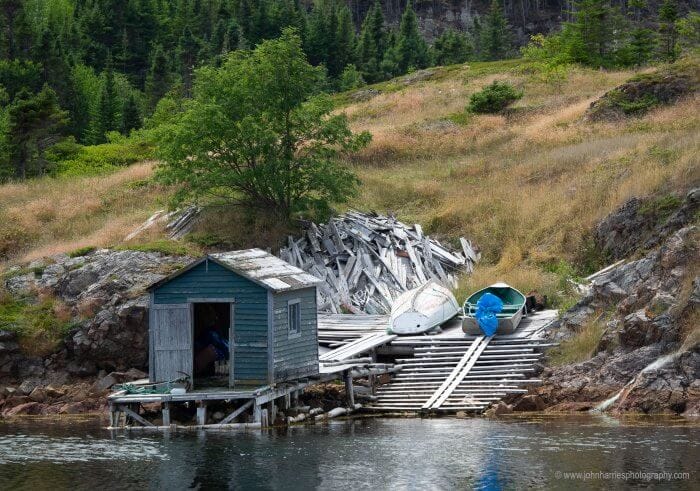
But maybe that’s just us who feel that way, based on the nostalgia John and I have for the days when we would arrive in an outport and the whole community would come down to the wharf to see the visiting sailboat. That was back in the days when the sea was the source of what mattered, including visitors.
The Way It Is
But since the end of the fishery, that life has pretty much disappeared, and now the focus is no longer on the sea and the boats that sail on it. The focus is now on what the city and the mainland have to offer.
And LBI is just one more community caught up in that tsunami: In February 2019, the last remaining 71 full-time residents voted unanimously to take the relocation package and close the community.
And that is why I am now able to write the article I promised the Committee: the inevitable has finally happened. Those who need the money to relocate will get it and, hopefully, those who love the community will keep it alive as a summer getaway and a beautiful stop for visiting mariners.
Heavy Hearts
But, despite the relief of a decision made, our hearts—along with those of many past residents of Newfoundland’s closed outports, I’m sure—are heavy at the news that another beautiful remote place will be abandoned as part of the urbanization of our world.
But we don’t blame anyone for making that choice. Neither of us can imagine living in such isolation full-time. We love to visit remote places, but we have the luxury of returning to our plugged-in mainland existence when it’s time to leave.
We just wish that we had stopped at LBI earlier instead of rushing by. That we had visited when the fish plant was still open, the community bustling with people of all ages, and the harbour blocked with boats. And, yes, at a time when a visitor arriving by sea meant more to the residents than just another tourist arriving in a camper van.

Hi Phyllis,
Nice article and appreciate yours and John’s sentiments. We were there a couple of seasons ago when decisions were still going against re-locating. I make harbor notes where we stop and include them below as we found the hiking quite nice.
My best, Dick Stevenson, s/v Alchemy
Little Bay Islands: Lovely place. We went in to the wharf where they had electricity, 15a service, and facilities–toilet, shower & laundry, all reasonably priced. We took walks to North Bay and up to the lookouts of Pole Hill (overlooking the harbor) and Bay View, both very nice. We continued on and looped back via an ATV road to the farther end of the harbor. When we were there this once vibrant island had just had a vote about resettlement, which almost passed. If it does pass in the future the facilities may be closed as the gov’t will no longer supply utilities or operate the ferry.
Hi Phylis,
LBI was strongly recommended to me by Peter Watkins when I overwintered my boat in Lewisporte and I wish I had followed his advice, even more so after reading your nice and thoughtful piece above. Thanks.
Important article, thank you Phyllis, it eloquently captures the dilemma faced by many Newfoundland communities, each a heart wrenching story. We have good friends in another community still trying to reach the steep 90% threshold. They are having to work well into their retirement years just to barely get by. It’s a unique problem that many people do not fully comprehend, so thank you for shining a light on it.
Very nice, but sad article. I can only imagine.
We are headed via auto to Newfoundland in a couple of weeks, to do some whale, iceberg and puffin watching, among other things. Oh, there happens to be a boat in Lewisporte that is beckoning a look see. If all goes well, in mid-June I’ll be departing for Maine. Although LBI is out of the way, I have been logging your other stops (clockwise from Lewisporte) as places to visit along the journey. Keeping fingers crossed the fog behaves itself and the westerly winds have abated somewhat. Very much looking forward to meeting people and experiencing the environs.
Thank you.
Hi David,
Please feel free to contact me off-site (alchemy128(at)gmail.com) for some info on the people and/or marina/boatyard in Lewisporte. I am happy to also make introductions and say you are coming, but the people there are so friendly and gracious that it may be nice to have done, but is hardly necessary.
My best, Dick Stevenson, s/v Alchemy
I know a few communities like that and spent time in them. You told the story well, and that made it hard to read. Each has a different story, but they add up the same.
Dear Phyllis & John
Wow! This article strikes home! I was ship’s doctor twice on a cruise between Anchorage and Nome to the Bering Straights, Siberia, King Island (we weren’t allowed to land), Pribilof Islands and the Aleutians. There were millions of birds around our zodiac in the Pribilofs, and we went out in the zodiac amongst a gam of whales spouting all around in the Bering Straights. What an exciting cruise!
The captain aboard was an experienced ice navigator. He grew up on Little Bay Islands and told me stories from his boyhood. The most memorable was one about the winter when he was about eight years old. A narwhal was caught in the ice and he went out every day to chop a hole so the narwhal could breath. He saved the narwhal’s life, and the story made it into the papers.
This story and his description of the icebergs floating past the town in the spring caught my attention. So I went there about 12 yers ago.
The day I arrived in the town to take a ferry to Little Bay Island, the ferry had a mayday with an engine problem. A fishing boat saved it just before it hit rocks.
Since the ferry was not servicing the island, the government provided helicopter service. Of course the fare to fly 40 minutes by helicopter to Little Bay Islands was the same as the ferry fee: $6.50 Canadian. My first ever helicopter ride was a bargain!
The harbor is gorgeous and it used to be home to seventy fishing schooners in good cod times. There are two all weather entrances and perfect protection. Superb! So I bought a house overlooking the harbor! Beautiful view!
I flew by helicopter back to the mainland, and had the foresight to ask if the ferry (helicopter) fee had a discount for seniors! Of course there was! I flew back to the mainland by helicopter for half price as a senior (over 60): $3.25 Canadian!
I never made it back to Little Bay Islands. I always enjoyed spending time on my boat more than in a house by the water. The house there was a dream that passed, and I sold it.
Your story of the passing of the settlement in Little Bay Islands hits home. Thanks.
From the captain I sailed with who grew up on Little Bay Island:
“The resettlement of LBI has really created a divide for families living and visiting there. There are those that will financially gain from the resettlement and those that will socially loose. Many don’t realize that both are applicable.
I will keep my cabin there (as will all of my brothers and nephews) and will continue to enjoy its beauty.”
Best wishes,
Charles
Charles L Starke MD FACP
s/v Dawnpiper
Sad story, but good reading.
We visited a few small remote mainland-Newfoundland villages by car two years ago. The efforts by the inhabitants remaining to save some of the villages were amazing and admirable.
Of course the real problem was mismanagement of the fishery when modern technology was over-applied by politicians hungry for votes in the 1960-1990 time frame.
Same happened in NW Scotland a hundred years earlier.
Hi Neil
I agree with your point about the underlying and original cause of the woes of these places being depletion of the local resource, in this case Cod. Tragically, this doesn’t show any sign of changing around the world, where there is a desperate need for governments to enact conservation measures that sustain local fish stocks, fishermen’s livelihoods and, yes, communities. That we still haven’t learned from this and other similar examples doesn’t offer much hope – there are far more bad examples out there than good.
Thank you Phyllis for an honest and well written article.
Best wishes
Colin
Thank you everyone for your kind and generous comments. It’s interesting how influential LBI, though such a small place, has been on those who sail there.
Having visited LBI this past summer and visited with some residents, I became deeply interested and compassionate about what they have been going through. Especially after visiting other places like Great Harbour Deep and seeing what happens to the place after resettlement. I think in the case of LBI residents will be able to keep title to their homes rather than have title transferred to the Province. Anyway, I saw this today on Facebook and thought it speaks to the issues so well I would post it here. Written by the one person who I think is staying. He has Facebook page “Kintsugi.” If too long please delete:
“A common comment/question I get on my pictures is …
“Why would people leave such a beautiful place?”
These are some of the reasons why people voted for resettlement.
The vast majority of the residents here are seniors with some well into their 80’s. As you can imagine (or are experiencing yourself), with age comes a variety of health issues that make it very difficult for you to do what you once did. Most of the people here burn wood as the sole heating source for there homes. As many of you know, dealing with wood is a hard physical task, especially in the winter time. Couple this with snow shovelling and it becomes a hardship, especially if you are a single widower, of which there are many here.
In addition to the physical hardship, many seniors have a variety of health concerns that require more frequent trips off Island to see a health care professional. During the winter months, these trips are made more difficult with inclement weather and/or near impossible when the Artic Ice comes in and the ferry cannot run. Although an helicopter service is made available, this is very weather dependent and you don’t have access to your vehicle on the mainland.
Also, as many have experienced, as ones health deteriorates, you become more nervous about the travel distance between you and an hospital, especially in an emergency situation.
Another reason people voted to relocate is because of the lack of services on the Island. To put it bluntly, there are no commercial services on the Island, such as groceries, gas pumps or restaurants, Really, the only thing you can buy on the Island is a postage stamp. Some individuals do not own a vehicle or even have a driver’s license so they are very dependent on the kindness of their neighbours to take them off the Island for supplies and/or appointments.
Since there is no commercial activity, a small number of younger residents must leave the Island for many months of the year to find work.
The school has long since closed since their are no school age children here, Indeed, their are no children here period.
For others, the social isolation, especially during the winter time is especially hard. For most residents, their families live elsewhere and only visit during the summer months. Even getting “out and about” during the winter months is difficult if you are older and have mobility issues. Many times during the harsh winters, Georgina and I see no one on our walks around the harbour.
For many of the seasonal residents who only come here during the nice summer months, it is easy to dismiss the feelings of the older residents who are nervous about being here during the winter times. A common refrain heard during the summer months is that “It is not so bad or isolated here”, yet many have never spent a winter here.
Others that voted “yes” only did so because of community peer pressure, As I have alluded to in previous posts, the handful of people who voted no in the October 2015 vote were treated very badly and became the object of much scorn and ridicule by those that voted yes. With such a small population, lives for those individuals became very difficult.
And to be completely honest and practical, many voted to relocate because of the money. $250,000 for a single resident and $260,000 for a couple is a great deal of money for a senior on a fixed income of Old Age Security. They see this as a once in a lifetime offer and a chance to be more comfortable in their golden years. For the younger residents, it gives them a fresh start and a new outlook on life.
While many may not agree with the resettlement of Little Bay Islands, I think we need to extend some compassion and empathy for those that voted to relocate. This was not an easy decision and to choose to uproot and leave the only home you have ever known is heartbreaking. Georgina and I wish them all the best and if you see a former resident of Little Bay Islands sometime, please make a point of saying hello, As anyone who has ever come to Little Bay Islands can attest, these are wonderful people.”